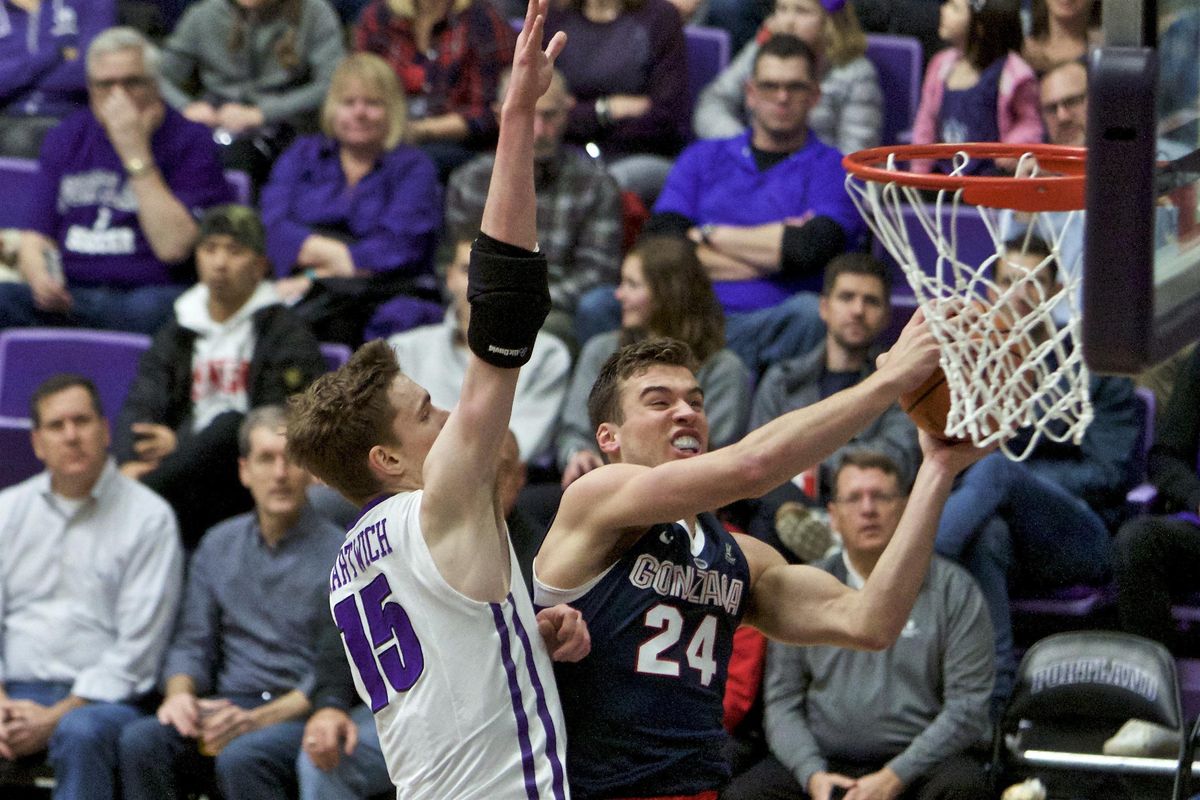TV Take: Portland’s defense, ESPNU’s crew took turns losing track of Gonzaga

There are a lot of words one could use to describe Gonzaga’s 95-79 West Coast Conference win Thursday night at Portland, but mesmerizing may not be one of them.
Dominating, sure. Hum-drum, OK, but that might be two words. How about workmanlike? That seems about right.
The same words could be used to describe the ESPNU broadcast featuring always reliable Roxy Bernstein on the play-by-play and the understated Caron Butler with the analysis.
What they saw …
The same thing everyone else saw, basically.
The Zags shot almost 60 percent for most of the game, shared the ball well and stepped all over the Pilots, who lost by 46 points a couple of weeks ago in Spokane.
Butler, the former Connecticut star, seemed most impressed by Gonzaga’s preparation against an opponent the Zags have defeated 10 consecutive times.
He harped on how intently they laid the groundwork for their offensive execution during walk-through Thursday afternoon. It’s why, he kept emphasizing, the Zags had won 19 consecutive conference road games – and 32 of 33 – heading in.
But it’s possible he didn’t match that preparation.
When Portland pushed the ball midway in the first half and converted a fastbreak basket, Butler chided the Pilots (8-14 overall, 2-7 in WCC play) for not playing at that tempo more.
“That’s the type of pace Portland is going to have to play to compete with the Zags,” Butler said. “You’ve got to run and force the tempo as much as possible.”
Problem is, no one in the WCC (with the possible exception of BYU) runs as well as Gonzaga. Pushing the tempo may work occasionally but usually is fool’s gold against a team that executes as well on offense as Mark Few’s team does.
Bernstein, who has witnessed quite a few GU games recently, knew better. But he also knows how hard it is to slow the 15th-ranked Bulldogs (18-4, 8-1).
When Corey Kispert nailed a 3-pointer midway through the second half that gave him a career high in points (he finished with 23), Bernstein used it as an anchor for a smart discussion on GU’s offensive prowess.
“That’s the thing when you match up with Gonzaga,” Bernstein said, “they have so many people who can hurt you. They are so balanced, so deep and so hard to defend.”
Butler agreed and added to the thought.
“Everyone is buying into this ‘sharing-is-caring’ thing on the offensive end,” he said. “That’s winning basketball and winning basketball is fun basketball.”
Though maybe not all that exciting.
What we saw …
A big part of the reason GU shot 54.7 percent from the floor – despite not scoring in the final 3 minutes, 51 seconds – can be attributed to the Portland defense.
The Zags shredded the Pilots with the high screen and roll, something Bernstein noticed and passed along to his analyst to explain.
“They are using that play to the fullest,” Butler said, “and the big is continuing to dive to the paint, making himself available.”
Killian Tillie, who tied his career high with 27 points, took advantage the most, but he, and the rest of the Zags, received an assist from Terry Porter’s game plan.
The Pilots coach decided he wasn’t going to let Josh Perkins create, as he had done in the first meeting, with seven assists.
At times, JoJo Walker would deny Perkins the ball back after GU’s point guard had made a pass. At other times the Pilots played a box-and-one, with the one on Perkins.
Either way, when Walker was extended guarding Perkins, he was not helping on the roll man. The Zags took advantage. Often.
But Butler never seemed to notice or, if he did, didn’t share the knowledge with the viewers.
Maybe his mind was on the most exciting WCC game of the night, down in Moraga, California, where Saint Mary’s remained undefeated in conference play, getting past BYU 75-62. As Bernstein said with about 10 minutes left in Portland, “There’s a tight one going on down in the Bay Area.”
At that point Gonzaga led by 21. Tight wasn’t a word you could use to describe this one.